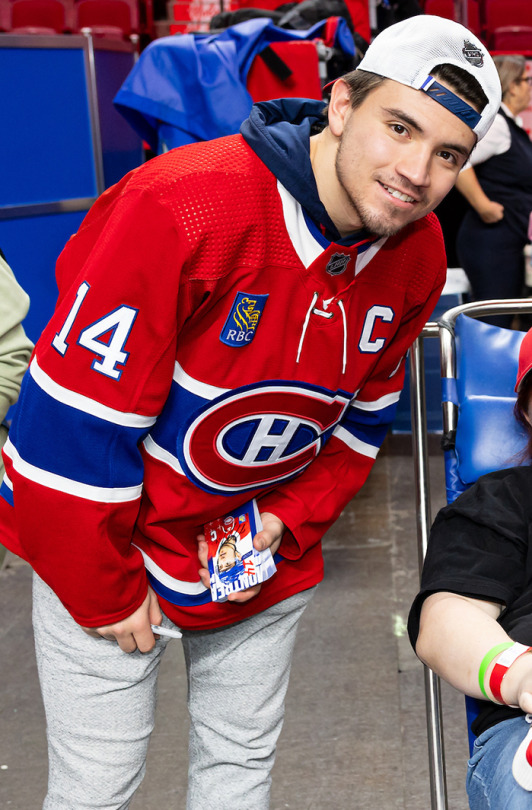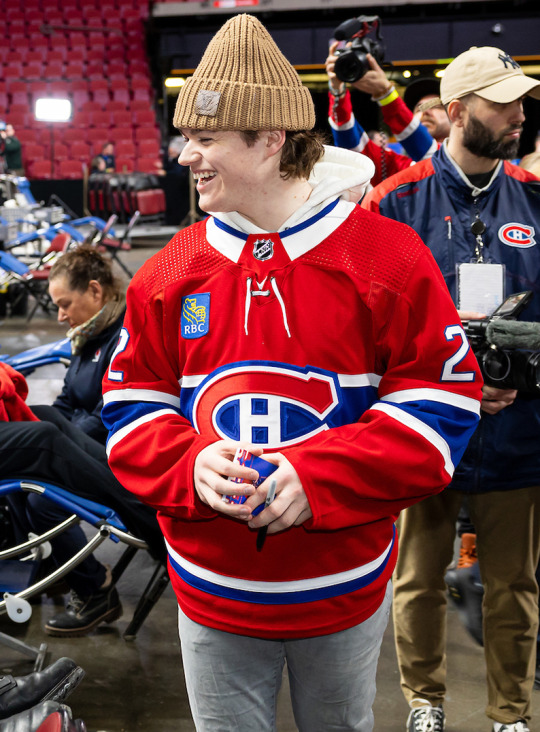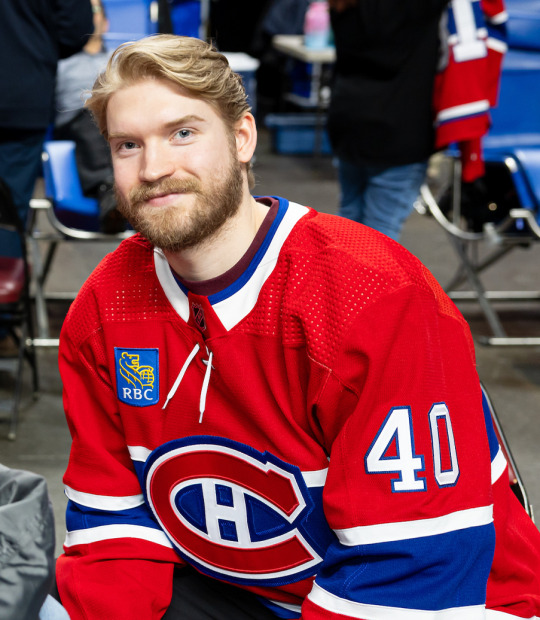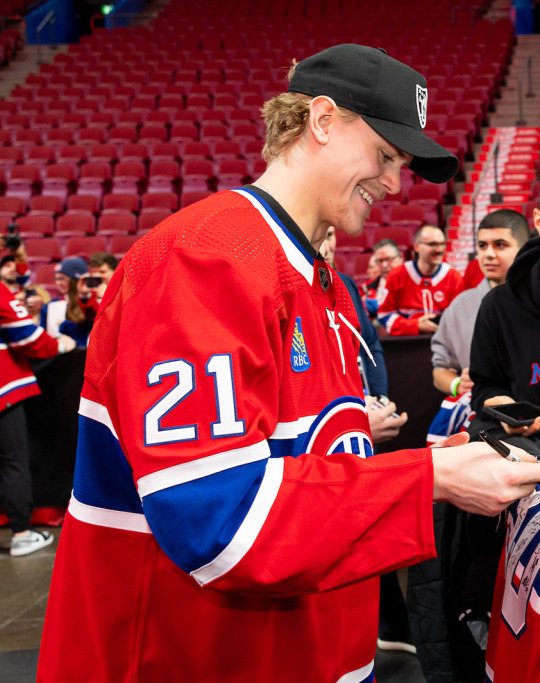#me vs the tumblr photo set algorithm
Explore tagged Tumblr posts
Text














Canadiens 2024 blood drive
#me vs the tumblr photo set algorithm#montreal canadiens#nick suzuki#cole caufield#juraj slafkovský#martin st louis#joel armia#samuel montembeault#johnathan kovacevic#jake evans#kaiden guhle#jayden struble#josh anderson#joshua roy#alex newhook#rafael harvey pinard#GOD lmfao
30 notes
·
View notes
Text
I have hard boundaries for myself about how I use social media that I've followed for the last few years. Ever since I briefly left tumblr and tried twitter, I took so much psychic damage from that experience that I had to make new rules about how I use the internet. Setting app timers did nothing for me, so I compromised: im allowed to use social media daily to my heart's content (which I found isnt actually all that much)- as long as isn't the FIRST thing I open when I wake up.
For YEARS it was my habit to crack open my eyes and click into FB or Twitter or Insta before I even got out of bed. It was like this compulsive Need to Know What's Going On Out There. what did I miss while I was asleep? Never much, but always some new drama, some new political blunder, some new Person of the Day everyone was dunking on. I hated it, but I COULDN'T stop. I physically couldn't resist.
So lately I've tried to replace that habit with, just, something else. Anytime I feel the urge to click into social media, I try using another app instead. Usually it's a game (dvc has been great for me bc of the social feature, but just as often I'll open up my coloring book, wordscapes, or any other game that keeps me busy for 2 seconds and fulfills the "click button get dopamine" urge). Especially first thing in the morning. My brain needs a solid 2-3 hours of consciousness before I can handle social media.
A cool life hack I learned recently is that it's easier to get up in the morning if you do something you actually LIKE to do first thing in the day. it's done wonders for my mental health. I went from "ugh, morning again? It was literally morning yesterday," to feeling like Spongebob hopping out of bed going "IM READY!" every day. Clicking into social media was NOT something I was doing because I liked it. Gaming is something I do because I love it. I love checking on my dragons, it makes me feel HAPPY to have looked at them, i make new friends playing games bc we already have something in common (ive rarely made new friends on social media. I used to make friends ALL THE TIME playing games like neopets, roleplaying and posting on forums, and building little websites and things- ive even made a bunch of friends on tumblr. Never on FB, though). It's a world of difference getting up and checking on my animal crossing villagers, who fill me with glee and delight, vs looking at FB first thing in the morning and feeling bitter about all the people I know who aren't paying attention to me.
So anyway, this has worked SHOCKINGLY well for me? Usually just clicking another app and looking at it for a minute fulfills the urge to have clicked the FB button, or whatever, which then goes away- and I have sated my craving without pissing myself off, and without creating additional urges by going on social media. I have been using social media SO MUCH LESS since I started doing this and I've been feeling amazing for it. And it's not always games. I also use more practical apps like Bearable and Habitica. Sometimes I'll even click thru my photos or notes instead of clicking the social app.
This morning, I broke my habit. For the first time in weeks or maybe even months, I woke up and clicked FB and Insta first thing. I shared a post or two lately and I was hoping my friends had seen it, but I knew they hadn't even before I looked. 2 likes, no comments. I clicked into Instagram and saw a Reel from Kevin James Thornton, a comedian and whole media personality who has over 600k follows on Instagram alone, pleading with his existing fans to choose to check up on him and to sign up for his email list instead, because the algorithm only wants to hook new followers. The 600k existing ones aren't good enough. Gotta have that exponential growth or else our shareholders will be very cross with us!
I realized this morning what it is about FB that makes me so irate, the thing that creates additional urges to post my whole ass and pick fights and be as annoying as possible: because I hate feeling like I'm being ignored. And this is a feeling social media manufactures for you CONSTANTLY. You log on and ONLY see posts that are already popular, posts that are already "getting engagement." Everyone else is clearly online commenting and interacting with all this other stuff except for yours. Why aren't you good enough? Don't they like YOUR posts? Why are they ignoring you? What did you do wrong?
You can KNOW wholeheartedly that Facebook gives incentives to certain posts/posters and that it does the opposite with certain topics, especially socio-political ones. You can know that it's the algorithm refusing to show your posts, and not your friends ignoring you. But still, you have a page, people know how to find you- can't they come to your page to check? Did they forget you exist? Do they just not care? You can SEE they're online, and they can see YOU'RE online, so what's not clicking???
In me, at least, this WILDLY increases the urge to post something dramatic, incendiary, or outrageous just to get a response. OH, you guys don't like me when im being polite and quiet? You'll really hate me when I decide to be annoying on purpose!
Which then increases engagement, providing you with positive reinforcement for posting "controvertial" things, starting fights, posts that provoke people into responding... If you wont choose to interact with my posts? Fine. I'll make the urge fucking irresistible. A positive reinforcement for fighting and doing other unpleasant things we don't like, and supposedly don't want to use social media for, and yet.
It's not merely that posting misinformation and getting in fights is profitable to these platforms. Why is it profitable? Because the more you engage with (read: fight) random strangers, the more other, new people are also exposed to your inflammatory conversations, which in turn sparks a response in them, and so and so forth.
If we all just gained 600k followers and then stopped, and we all saw every update they made, and we all just hung out in our own corners and minded our own business? Sure, that would be lucrative for the creators with all those followers, but Instagram wouldn't be experiencing exponential growth- they need MORE new users, MORE old users spending MORE time on the app, following MORE people, leaving MORE comments, SEEING MORE ADS, because they need more and more and more for their shareholders. Influences are the product just as much as regular users.
I'm thinking about that post that talks about how, as income inequality gets worse and the middle class shrinks, advertising gets more and more aggressive, despite people's ability to spend shrinking with each new day. This feels similar somehow? Like, people are starting to get wise to the fact that social media makes us feel like crap, and that the excuse of "I have to use it to stay connected to everyone else" falls flat when you're not actually connecting with those people. Even as the internet continues to shrink, more and more people are getting fed up with social media and using it less, or leaving outright, because it's becoming less and less usable, more ad-ridden than ever. And yet it reinforces the need for those platforms to get more aggressive, to bring in more users to replace the ones they're losing. It's a never ending cycle of "we have to cause you psychic damage! in the interest of roping in more people to damage psychically :)" and we all know we're doing it, and we all hate them for it, and yet we can't stop.
Once again I have to mention that absolutely fucking BIZARRE interaction my bf had the other day. Someone he knew "liked" a comment that was spreading misinformation and a very anti-treatment sentiment about DBT. He messaged this friend privately to ask if they really thought that. They told him, "I dont know what DBT is. I just click 'like' on any comment someone I think is cool makes." When my bf pressed them further, along the lines of, "why would you do that?" They said "for engagement." This was not an influencer, this is not a brand or a page or a business account they were using. It was a personal account w a few hundred friends. I just CANNOT get over this. Clicking buttons just because they're there, "for engagement" lmao. Engagement for whom, my good bitch? They might be interacting with your posts, but this is not "your" platform. The engagement isn't for you, sweaty. But ok.
I dont have a conclusion or any suggestions here. Just an observation. What a fucking mess. Social media demanded that we all make ourselves available 24/7, trained us to React instead of to care, convinced us all that we are each some kind of personal brand that requires social marketing to maintain, got us to pick fights with each other constantly as a result, made the internet a miserable place to be, and we have thanked them for the privilege.
Anyway. No more letting the algorithm tell you what to care about today. Contact me thru a series of intricate rituals or not at all. If it's really that important you can send me a Neomail 👍
#me#internet#join me on neocities too btw. im horce-divorce.neocities.org#im probably also gonna make a new personal tumblr#this ones getting too many follows and i dont want my mom to find it
1 note
·
View note
Text
See, unfortunately, this ties back to EXACTLY what I was talking about with "fair use for me but not for thee".
It makes sense as an argument - somewhat - if you believe the popular myth that all a machine learning algorithm does is save images off the internet and rearrange bits of them into something else, which it very much does not - but even if you DO believe that myth, you're discrediting collage and other assemblage, or for that matter, many if not all fan works. A lot of that isn't done with permission, and despite that, it's generally considered Art(TM). A dick move, sometimes, depending on the piece and its purpose, but not Theft(TM) most of the time, let alone Fake Art(TM).
But when you get into the reality of it - that it not only doesn't contain a single image, but physically, mathematically CAN'T, and in fact is just STUDYING literal billions of images to know what patterns of pixels tend to represent certain keywords, then it becomes even harder to argue that anyone is being "stolen" from - at that point you are inherently arguing that REFERENCING is theft by several orders of magnitude more. Any given image that contributed to the weights that tell a model what "a horse" or "watercolors" look like is contributing less to the model's "understanding" of what these things are than any, yes, ANY image you've ever seen contributes to yours; unless you're over 150 years old and have spent your entire life just looking at images, you've gleaned your understanding of what a painting of a cat looks like from FAR fewer images than any AI model has. If studying hundreds of other people's art to make your own interpretation of what a stylized cat looks like is fair use because you're not just directly copying one of them in particular, then studying hundreds of millions to the same end must also be, because again, you are taking FAR less influence from any of those pieces and you (or your tool and the HUMAN PEOPLE who made it) are doing much more original work to make the end result coherent-
Unless your goal in making a distinction is just to define an ingroup - Real Artists, Victims Of The System, vs. an outgroup - the devious Technical Brother Art Thieving Lazy Jealous Jerk. It works VERY well for that.
That said, there IS a meaningful critique of how the datasets are compiled, and I feel it's exemplified very well by this:

Remember how this got a whole bunch of people really angry at tumblr over it when that phrasing first changed? Well, the thing is, it's not actually tumblr's fault; it's just how the internet works. It is, in fact, impossible to block webscrapers completely without making a page's contents unavailable to the general public (e.g., by a login wall), and there is no law saying that webcrawlers have to honor privacy settings. This on top of the fact that Facebook et al have been slowly boiling the frog to encourage us to overshare, and only now is this here to give people the shock reminder that the public internet is, in fact, PUBLIC, and the things we choose to post long-term IN PUBLIC are in fact readily available, preserved, there to study, IN PUBLIC...
There is a dataset ethics issue, and it is a PRIVACY issue, not one of plagiarism/copyright. What we need to be doing is focusing on privacy. The right to disappear. The right to opt out of automated studies and reasonably expect it to be honored. The right to be able to do the digital equivalent of putting up a "no photos" sign at a real world show and expect it to, if nothing else, at LEAST be honored by people who call themselves professionals.
This, incidentally, is why I...somewhat support the use of tools like Glaze or Nightshade in conjunction with NOAI/disallow all flags - those tools are not as effective as they claim to be and I take umbrage with that, BUT if adopted in conjunction with such flags on a wide scale, they could potentially enforce respect for flags on a cultural and practical level by making the end product of any company that looks at a "do not datamine" flag and says "how about I do anyway?" meaningfully worse!
In other words, fight KOSA and the like and push for privacy protections; the problem isn't MOSTLY, but ENTIRELY capitalism.
Economic anxiety has a way of bringing out reactionary sentiment in anyone if they're not careful.
It is deeply, deeply frustrating to watch it play out in front of me in leftist spaces such that self-proclaimed leftists are using actual, literal fascist arguments about Real Art vs. Fake Art and Real Labor vs. Lazy Button-Pushing.
These things don't become any less bad when you SAY your enemy is "some rich techbro" while calling broke disabled hobbyists "evil soulless automatons".
The central logic doesn't become true when you SAY you're targeting an inhuman machine while you screech obscenities about a great replacement at its operator.
When you say one minute "there is no unskilled labor, only undervalued skills", it doesn't magically absolve you of saying "nooo, you were supposed to automate away the BAD and DEMEANING jobs with no financial safety net for the workers, not THIS one I consider RESPECTABLE" in the next breath; it only makes you a fucking hypocrite.
"Fair use for me but not for thee" is not a rational position to prevent plagiarism and forgery; it's just a means to codify an ingroup and an outgroup.
"Degenerate art" is always, ALWAYS reactionary and proto-fascist thing to believe in, even if you wrap it up in other fancy words because you know "degenerate" is a Bad Word. "There is Good Art that makes society better and Bad Art, if you can even CALL it Art at all, that will rot our brains and turn us all into mindless drones if it's allowed to survive" cannot be made into anything but a reactionary position! Period! End of!
"Lazy button-pushers" are EXACTLY what corporations want you to think ANY automation operator is, so they can take credit away from those employees and criminally underpay them. They said the same damned thing about digital artists back in the early days of Photoshop. They say the same thing about overworked VFX artists today. You are DIRECTLY helping them make it worse with this argument.
The same old fucking trick of making you uncertain of your financial future so you lash out at other victims of the system because you "can't take the risk" of coming together to fight the actual enemy? Is working a FUCKING treat on way too many people who pride themselves on Not Being Like That - and it's even worse because a lot of the time pointing this out will get nothing but denial because maintaining pride in a leftist, progressive, pro-labor, pro-human Identity is more important to way too many people than ACTUALLY identifying the root of reactionary sentiment and the strategies used to spread it.
It makes me genuinely feel like I've fallen into a Fox News convention, hearing all these blatantly reactionary arguments and actively self-defeating strategies to Protect Labor.
671 notes
·
View notes
Text
starting to realize how different tumblr is for me in 2022 vs in like. 2019 with <100 actual active followers. even though i have my own settings disabling suggested posts, algorithmic dashboards, "based on your likes", i don't search tags or anything much, and can control reblogs, there's basically nothing afaik stopping my random and potentially personal posts from being fed into someone else's dash somewhere even without having any connections to begin with. like idk tell me if i'm being weird but it feels so much more like ppl are walking in completely on unrelated communities and it no longer feels like me and a collection of individuals, mostly mutuals, but like there is an actual Public here. it's making me feel like i wrote my number on a bathroom stall hoping my crush would see it and call me and instead a photo of it got published on billboards around the city
#tbc this is an admission that i need to take things into my own hands to sculpt the experience i want here#not like. me just complaining about changes#though i am. not sure i like where this brings us
6 notes
·
View notes
Text

I posted 1,185 times in 2021
243 posts created (21%)
942 posts reblogged (79%)
For every post I created, I reblogged 3.9 posts.
I added 422 tags in 2021
#photography - 111 posts
#text - 71 posts
#quotes - 45 posts
#asks - 39 posts
#on set photos - 31 posts
#art - 29 posts
#star wars - 28 posts
#cowboy bebop - 24 posts
#thank you! - 23 posts
#black and white photography - 21 posts
Longest Tag: 133 characters
#but at school i played around a lot on what was then known as yahooligans! because i didn't give a damn about doing actual schoolwork
My Top Posts in 2021
#5
New to me movies:
The Mitchells vs the Machines (2021)
Loved it. We don't even call things "formulaic" now; we call them "algorithmic,." which is fitting coming from a PG-rated telling of The Social Network meets Terminator 2. And I'm not complaining. They got the guys who directed The Lego Movie to write and the studio behind Into the Spider-verse to design. The pacing and comedic timing is so precise you could swear the movie went by in half an hour.
Ghost in the Shell (1995)
It draws you in to an action flick and spits you out having injected some dark, philosophical subject matter into your brain. To say nothing about its animation style or its giving androids more of a soul than most characters have. I'll have more to say after a re-view.
13 notes • Posted 2021-07-11 17:40:54 GMT
#4

https://en.wikipedia.org/wiki/Deaths-Head_Revisited
37 notes • Posted 2021-01-27 23:54:42 GMT
#3

Cleaning my room and found this. A for effort, I guess.
38 notes • Posted 2021-02-08 02:29:20 GMT
#2

Of course he did.
57 notes • Posted 2021-09-05 21:27:22 GMT
#1
I think with the whole canal situation, we need to solve a big, dumb problem with a big, dumb solution:

6122 notes • Posted 2021-03-28 02:01:02 GMT
Get your Tumblr 2021 Year in Review →
4 notes
·
View notes
Text
Tumblr Helped a Generation of LGBTQ+ Artists Come of Age

Laurence Philomene, me vs others - molly soda as me, 2018. Courtesy of the artist.
Sarah Maxwell’s pink-hued, sultry illustrations look like Roy Lichtenstein paintings with a lesbian twist. But unlike Lichtenstein, who had an abundance of readymade heteronormative tropes to satirize, Maxwell’s work doubles down on sincerity. Her cigarette-smoking, lovesick queer girls are unapologetically dramatic, reveling in the spotlight. Maxwell, whose graphic novel-esque illustrations have appeared in Wired and Playboy, traces her inspiration back to Tumblr, which she joined over a decade ago. “I was always searching for lesbian visibility in the media, whether it was in TV shows, movies, or art, but there was hardly any,” she said. Encouraged by the growing LGBTQ+ presence on the platform, she began her drawing practice “to get the representation that [she] craved.”

Courtesy of Sarah Maxwell.

Courtesy of Sarah Maxwell.

Courtesy of Sarah Maxwell.

Courtesy of Sarah Maxwell.

Courtesy of Sarah Maxwell.
When Tumblr launched in 2007, Don’t Ask Don’t Tell was in full effect, marriage equality across the U.S. was eight years away, and a mere 1.1 percent of regular characters on broadcast television identified as LGBTQ+. (Among them, so many were killed off, it became a running joke in the gay community.) The internet offered new means of connection for a group that historically relied on covert signals and underground bars to find each other. Tumblr expanded that digital haven, making space for more positive, deliberate depictions of queerness: loving illustrations of gay couples, binary-breaking self-portraiture, and eclectic zines and comics exploring themes long ignored by publishers.
Today, with increasingly streamlined social media platforms, spaces for creative expression and collaboration can already feel limited, but the landscape is especially suffocating for LGBTQ+ creators. Earlier this month, YouTube refused to classify homophobic comments as harassment. Facebook and Instagram’s notoriously stringent community guidelines have drawn criticism for marginalizing non-binary bodies. Tumblr, long seen as the zany cousin of these more buttoned-up social sites, has moved away from its irreverent roots, and incited ire across the web over a controversial decision last December to ban all nude content. Creators who use the body to explore gender and sexuality have had years of content suddenly removed.

Courtesy of Jua O'Kane.
It wasn’t the first time Tumblr alienated its loyal queer userbase. In 2013, just after Yahoo bought the platform, Tumblr blocked #gay, #lesbian, and #bisexual hashtags on their iOS app’s search feature, and, in 2017, a blip in a new content filtering system temporarily censored LGBTQ+ content. Still, despite these missteps, in its heyday, Tumblr defined a generation of artists’ coming-out experiences and understanding of representation.
Queer creators overwhelmingly describe Tumblr’s early community as close and intimate. Unlike Facebook, Tumblr’s tendency toward anonymity leaves users free to shape their identity how they pleased and, unlike Twitter, the commenting system is more contained, disincentivizing bullying and curtailing the spread of hate speech. Hobbes Ginsberg, a Los Angeles–based photographer who grew up in Nicaragua, believes the emotional openness fostered on Tumblr is rooted in the intertwining of images and text. “Because it was so multimedia, it lent itself to talking about things next to sharing images,” she said. “I made a lot of really personal and vulnerable text posts alongside my photo work.” Today’s platforms, she added, are not as conducive to that vulnerability. “You can’t free-flow, diary-post on Twitter.”

Courtesy of Hobbes Ginsberg.

Courtesy of Hobbes Ginsberg.

Courtesy of Hobbes Ginsberg.

Courtesy of Hobbes Ginsberg.

Courtesy of Hobbes Ginsberg.
Arvida Byström, a Swedish photographer, added that these longer text posts also allowed for political and social discourse to emerge. Nuanced discussions of identity cultivated vibrant and diverse LGBTQ+ subcommunities. When Nevhada, an illustrator who runs the zine queer-spirit, joined Tumblr around 2010, she wasn’t familiar with the lexicon of gender and sexuality, having been raised in a small Italian town. “I just knew what I had felt towards other people,” she said. On Tumblr, she found the words to describe what she felt.

What happens in may stays in may 1, 2015. Arvida Byström Annka Kultys Gallery
Such a culture laid the foundation for more mainstream inclusivity down the road. Alex Norris, the artist behind the popular comic Webcomic Name, noted, “Tumblr was the first place I saw accounts announcing their pronouns and gender/sexual identities at the top.” It was standard, Norris added, for many artists, not just those making art with LGBTQ+ themes.

Courtesy of Alex Norris.

Courtesy of Alex Norris.

Courtesy of Alex Norris.
Tumblr’s reblog feature made the platform less performative and more participatory. Users weren’t just posting for likes, but became curators of an ongoing, massive group exhibition that included artists’ work alongside found media. Subcommunities recirculated imagery from queer film classics like But I’m a Cheerleader (1999) and Paris is Burning (1990). Political commentary lived alongside GIFs from the show The L-Word (2004–2009), explainers about LGBTQ+ flags, and darkly humorous memes about coming out. Andre Cavalcante, a professor of LGBT media studies at the University of Virginia, described how this mixing and matching of visual imagery on Tumblr is better suited to queer communities, allowing users to craft an identity that is “patchwork, dynamic, and evolving,” and “express[es] an emergent identity in a way that sites such as Facebook and Twitter simply do not allow.”

Liberal Jane, Save the Binary, 2018. Courtesy of the artist.
Until 2017, Tumblr’s dashboard was chronological, affording everyone an equal shot at visibility. Rather than silo users off in algorithm-driven, interest-oriented echo chambers, the original dashboard facilitated the intermingling ideas and discovery of new subcultures. “It was usual to see that the person who reblogged that Lord of the Rings meme has a post about the difference between bisexuality and pansexuality or transgender rights in India,” Norris explained.
For artists posting original work, reblogs offered a way to find like-minded creators. Ginsberg was drawn toward the “sea punk” look—a Tumblr aesthetic that blended nautical motifs with ’90s nostalgia and spawned an art, fashion, and music movement. Her work was reblogged alongside artists like Laurence Philomene, who took cues from “the classic Tumblr aesthetics: the pastels, the still lifes, the slightly shocking but hyperfeminine,” they said (Philomene uses they/them pronouns). The artists, who became friends IRL, were similarly inspired by Tumblr’s visual trends, including “vaporwave” and “soft grunge.” They featured nostalgia-inducing soft palettes, moody gazes, and dreamy settings, contributing to the introspective, cinematic atmosphere that came to define the platform.

Laurence Philomene, commercial - editorial for polyester zine, 2014. Courtesy of the artist.

Laurence Philomene, me vs others - kiss (on being single), 2018. Courtesy of the artist.

Laurence Philomene, feminine id - antoine and asher, 2012. Courtesy of the artist.

Laurence Philomene, diary - billy with blue hand, 2016. Courtesy of the artist.

Laurence Philomene, dreamboats - graeme & pepto bismol, 2016. Courtesy of the artist.
Tumblr’s collaborative framework was also conducive to fan communities. For many users, fandom played an important role in the coming-out process. Maya Kern, an illustrator who makes body positive illustrations, got into Tumblr through digital comic fandom. “The character I felt most strongly drawn to was a lesbian, and I was like ‘hey, this is weird, what does this mean?’” Kern recalled.
But it was not all acceptance and community, Kern noted that even within the LGBTQ+ community, some identities were not treated with the same legitimacy as others. And on the quest for social justice and tolerance, “a lot of discourse that started with good intentions turned into a really weird mess of people fighting to be the most outraged person in the room.” Today, she said, the community has fragmented, polluted by infighting and hate speech.
Spurring on Tumblr’s demise is the sanitization of the site. Scrolling through Philomene’s abandoned page offers a glimpse of the consequences of the nudity ban. Littered between their photos are notes from Tumblr: a post containing “adult content” has been hidden from public view. Still, what’s left on their page—solo portraits featuring symbols of femininity: florals, hairbows, and bright orange wigs in Philomene’s likeness—reflect the kinds of representation that flourished on Tumblr during its prime.
The deterioration of Tumblr’s community marks the downfall of one of the last sites where the charm and adventure of the early internet still lingered. Social media platforms have become more homogenous, dominating over the web’s earlier eccentricities: DIY GeoCities sites, hyper-customizable MySpace profiles, rambling web forums. If Instagram’s purpose is to brand and sell your identity, Tumblr was founded as a space to question and explore it. In that way, it was always a little queer.
from Artsy News
0 notes